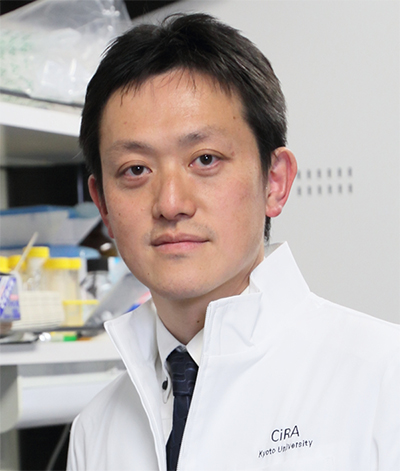
Research Activities
Research Activities
Principal Investigators
Dept. of Cell Growth and Differentiation
Shin Kaneko (Professor)

Shin Kaneko M.D., Ph.D.
- Lab Website
- Research Progress in FY2024
- Contact: kaneko-g*cira.kyoto-u.ac.jp
- Please change * to @
Research Overview
Our research aims to ensure the safety of iPS cells and fulfill the full potential of immunotherapy by exploiting the special characteristics of iPS cells. T lymphocytes are a type of white blood cell whose functions are activated by antigen-specific recognition of target cells via T cell receptors (TCR), formed by gene rearrangements during their maturation, that recognize target antigens. However, iPS cells created by reprogramming T lymphocytes (T-iPS cells) retain the TCR gene sequence of the original T lymphocytes. Taking full advantage of this property, we established an inducing method to redifferentiate rejuvenated cytotoxic T cells in large quantities from antigen-specific human T-iPS cells. (Nishimura et al., Cell Stem Cell, 2013; Ito et al., Communications Biology, 2021).
We have progressed with basic research to bring this technology to the clinical stage. By inserting patient-specific T-cell receptor genes into HLA homozygous donor-derived iPS cells produced at CiRA, we demonstrated the possibility of creating antigen-specific T lymphocytes that can be used safely in many patients (Minagawa et al., Cell Stem Cell, 2018). In addition, we also enhanced the antigen-specific T cell induction process to establish manufacturing and expansion culture processes free of animal-derived substances. By simultaneously inducing chimeric antigen receptor (CAR) genes, we showed the feasibility of supplying iPS cell-derived CAR-T lymphocytes to large numbers of patients (Iriguchi, Yasui, and Kawai et al., Nature Communications, 2021; Kawai et al., Molecular Therapy, 2021; Ueda T. et al., Nature Biomedical Engineering, 2022). Furthermore, by using a range of techniques to minimize the immunogenicity of iPS cells, we showed that it may be possible to supply T lymphocytes for therapeutic use from just a small number of iPS cells (Xu and Wang et al., Cell Stem Cell, 2019; Wang et al., Nature Biomedical Engineering, 2021). Some of these technologies have been licensed to private-sector enterprises for clinical development.
Elsewhere, we are working on the differentiation of other T lymphocyte subsets from iPS cells (Kitayama et al., Stem Cell Reports, 2016), as well as other cell types such as natural killer cells and other innate lymphocyte subsets (Ueda N. et al., Stem Cell Reports, 2018; Ueda T. et al., Cancer Science, 2020) and macrophages (Higaki and Hirao, Molecular Therapy, 2018; Iwamoto et al., Molecular Therapy Methods & Clinical Development, 2021). Our goal is to develop different immunoregenerative therapies by emphasizing the particular characteristics of each subset.
Altogether, these research projects allow us to significantly contribute to the development of regenerative medicine and improve treatment outcomes in areas such as cancer, infectious and autoimmune diseases, and transplant surgery.

























